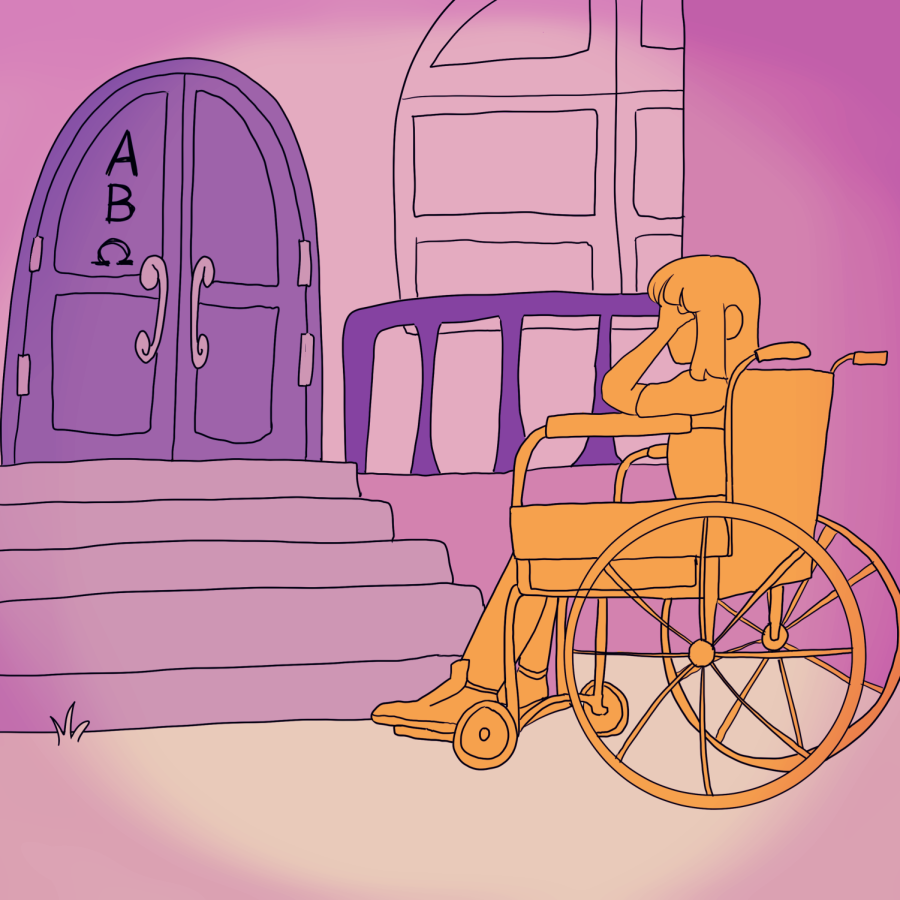Opinion | Greek life shuts out people with disabilities
Feb 7, 2023
Spring semester has begun, and with that, an influx of emails and direct messages encouraging students to rush fraternities and sororities are peppering inboxes and social media pages.
While many college students join Greek life to build friendships and gain a sense of belonging, others avoid it like the plague due to its inherently exclusionary nature.
The heavy dues totaling thousands of dollars discourage many from even considering it. Students of color often report microaggressions. Sexual violence runs rampant. While all these issues are important, many overlook how Greek life is inaccessible for people with physical disabilities, which presents a barrier when they seek to rush.
Out of the 87 total Greek organizations at the University, only Kappa Delta is equipped with an accessible ramp for entrance. According to a student from the University who rushed a different fraternity, members had to carry students in wheelchairs “up and down stairs” due to the fraternity house’s lack of a ramp.
While public organizations are required by law to follow the construction standards of the Americans with Disabilities Act, private organizations — which include fraternities and sororities — do not have to comply with these regulations.
Get The Daily Illini in your inbox!
Even though Greek organizations are private, they shouldn’t take advantage of their status to ignore other people’s needs and exclude others. In the progressive age we are currently in, lack of accessibility is unacceptable.
The University is credited with having the first post-secondary disability support service program in the world, called Disability Resources and Educational Services. Dr. Timothy Nugent, the founder of DRES, pioneered an accessibility-first mindset by leading the University to make living spaces accessible and integrate students with disabilities.
But the University’s storied history in helping people with disabilities access their environment is obsolete when it comes to Greek life. Considering that students have a world-class program and support for students with disabilities, the University should step in for students with disabilities who want to rush.
Lack of funding is often cited as the cause of why Greek houses are inaccessible for students with physical disabilities, but that excuse is insubstantial. Greek organizations make money from their pledges, fees charged, dues, alumni contributions and fundraisers. Out of the thousands of dollars gained, at least some of it should be invested toward increasing access for people with physical disabilities.
People with disabilities are not a commodity. Citing funding as a reason for the lack of accessible entrances is objectifying and treats basic access as a privilege rather than a right.
By equipping Greek houses with ramps, following policies listed by the ADA and working with DRES to improve access, Greek organizations can start to close the gap between diversity and inclusion.
At any university, inclusion is important for more than just academics. A student with a disability may be accommodated in the classroom and have accessible entrances, but they are not prevented from suffering socially.
Students with disabilities who want to join Greek social circles are often deterred from doing so due to these constraints. They might feel like they have to hide a part of themselves in order to be accepted — Greek organizations will reject people outright if they don’t fit the mold of what they consider acceptable.
Diversity does not solely apply to skin color. Greek organizations can expand their outreach by making disability part of their diversity efforts.
Safia is a freshman in LAS.






